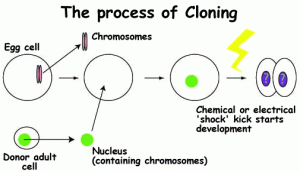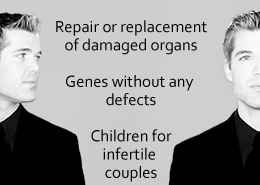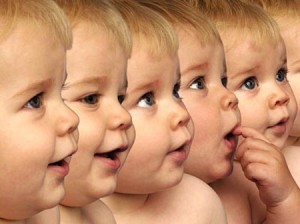Cloning is not something new. Mammals have usually been cloned by nuclear transfer technique which involves fusion of a donor cell and an egg cell. With growing science and technology, scientists have pointed out the possibility of cloning human beings in a similar fashion, i.e., producing not two identical twins but a child identical to parent. Although this possibility is remote at present, it does exist, raising a plethora of moral, social, cultural and economic, apart from scientific question.
Cloning is a departure from the natural order of things: it is deliberate and artificial since it involves asexual reproduction and asexual lineages of species have not lasted long. There are many who see human cloning as an attempt to improve the human race. Scientists argue that cloning may be used to study genetic diseases. If human beings can be cloned, then the technique can be used to recover a loved one, who is no more. In cases of infertility, a person can give his/her own cells to produce to a clone. Clones should be made for harvesting organs. It could also be used in human beings to treat diseases by replacing the diseased cells. Clones would be very useful as a supply of spare parts for humans. A cloned body part is understandable, it could replace the silicone used in cosmetic surgery, it could eliminate using transplants, genetic diseases could be cured and defective genes could be replaced, and the nerves could be re-grown, amputees could have their limbs grown back, spinal cords could be regrown for quadriplegics, the point is, that it could help us with many medical issues.
However, sceptics regard cloning to be a dangerous technology- a technology that would threaten the very foundation of human civilisation. The cloning of human beings is a serious undertaking that should not be done cavalierly or unnecessarily. Most religions in the world teach that while everything created ultimately has its source in God, there is a special aspect to human creatures called the soul or the spirit which is not found in plants or animals. Only God can give this particular kind of spiritual life to a being. Therefore a human who was cloned might be genetically identical, but would lack a spiritual nature, making the resultant creature less than truly human. If human race is perfected through cloning, it will cause major strife among the members of the same race, the other people constantly being called inferior, or stronger, when in essence, they are the same. In a nutshell, if misused, this technique could lead to the unfolding of man’s commercial potential in the face of a new technique.
Dolly, the sheep, cloned by Dr. Wilmut and his colleagues was born after 277 attempts, of which only 29 of the fused udder cells actually became embryos, which were implanted in 13 ewes of which one became pregnant and gave birth. She expired a few years after birth because of a severe lung disease and arthritis, which is extremely unusual for an animal at such an early age.
No view can be absolute. It would be highly impractical to completely ignore the benefits of the new technology and over-emphasise ethical issues. I believe that there should be a governing body that approves all incidents of cloning. There should be policies and procedures put into place to make sure that the whole process are ethical and humane as possible. A need for the cloning should be sufficiently proven before granting the permission. A reasonable legislation to prevent unscrupulous use of technology would be the first step towards ensuring human benefits. If the ill-effects of human cloning that can be guarded in some way, the idea of further research on the issue might not be bad at all.
Weighing the advantages and disadvantages of human cloning, the odds of success are quite low. I don’t find the cloning of human beings to be objectionable inprinciple as most people seem to believe it is, the practical application of the technology concerns me very much. Present circumstances don’t seem to warrant it. But this new technology would make human reproduction of identical human beings, assuring better quality and a degree of design predictability, long associated with industrial production. Human cloning would certainly make life more mechanical as opposed the organic.
-Tanvi Shah







21 Comments